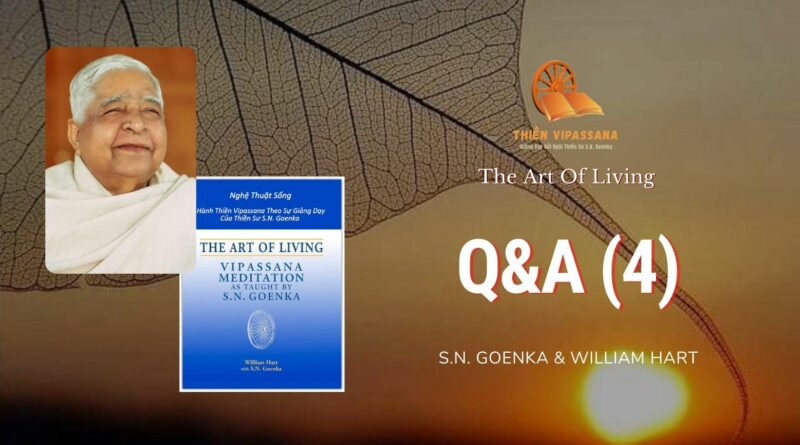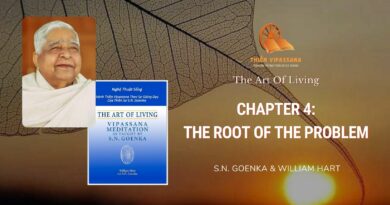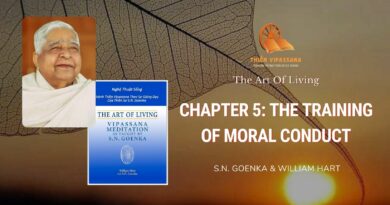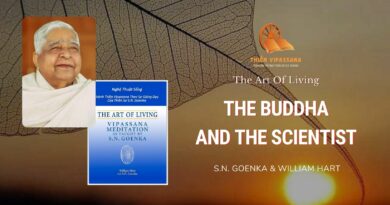Questions and Answers
QUESTION: Can’t there be wholesome cravings and aversions—for example, hating injustice, desiring freedom, fearing physical harm?
N. GOENKA: Aversions and cravings can never be wholesome. They will always make you tense and unhappy. If you act with craving or aversion in the mind, you may have a worthwhile goal, but you use an unhealthy means to reach it. Of course you have to act to protect yourself from danger. You can do it overpowered by fear, but by doing so you develop a fear complex which will harm you in the long run. Or with hatred in the mind, you may be successful in fighting injustice, but that hatred will become a harmful mental complex. You must fight injustice, you must protect yourself from danger, but you can do so with a balanced mind, without tension. And in a balanced way, you can work to achieve something good, out of love for others. Balance of mind is always helpful and will give the best results.
What is wrong with wanting material things to make life more comfortable?
If it is a real requirement, there is nothing wrong, provided you do not become attached to it. For example, you are thirsty, and you want water; there is nothing unhealthy in that. You need water so you work, get it, and quench your thirst. But if it becomes an obsession, that does not help at all; it harms you. Whatever necessities you require, work to get them. If you fail to get something, then smile and try again in a different way. If you succeed, then enjoy what you get, but without attachment.
How about planning for the future? Would you call that craving?
Again, the criterion is whether you are attached to your plan. Everyone must provide for the future. If your plan does not succeed and you start crying, then you know that you were attached to it. But if you are unsuccessful and can still smile, thinking, “Well, I did my best. So what if I failed? I’ll try again!”—then you are working in a detached way, and you remain happy.
Stopping the Wheel of Conditioned Arising sounds like suicide, self-annihilation. Why should we want that?
To seek annihilation of one’s life is certainly harmful, just as is the craving to hold on to life. But instead one learns to allow nature to do its work, without craving for anything, not even liberation.
But you said that once the chain of saṅkhāras finally stops, then rebirth stops.
Yes, but that is a far-off story. Concern yourself now with the present life! Don’t worry about the future. Make the present good, and the future automatically will be good. Certainly when all saṅkhāras that are responsible for new birth are eliminated, then the process of life and death stops.
Then isn’t that annihilation, extinction?
The annihilation of the illusion of “I”; the extinction of suffering. This is the meaning of the word nibbāna: the extinction of burning. One is constantly burning in craving, aversion, ignorance. When the burning stops, misery stops. Then what remains is only positive. But to describe it in words is not possible, because it is something beyond the sensory field. It must be experienced in this life; then you know what it is. Then the fear of annihilation will disappear.
What happens to consciousness then?
Why worry about that? It will not help you to speculate about something that can only be experienced, not described. This will only distract you from your real purpose, which is to work to get there. When you reach that stage you will enjoy it, and all the questions will go away. You won’t have any more questions! Work to reach that stage.
How can the world function without attachment? If parents were detached then they would not even care about their children. How is it possible to love or to be involved in life without attachment?
Detachment does not mean indifference; it is correctly called “holy indifference.” As a parent you must meet your responsibility to care for your child with all your love, but without clinging. Out of love you do your duty. Suppose you tend a sick person, and despite your care, he does not recover. You don’t start crying; that would be useless. With a balanced mind, you try to find another way to help him. This is holy indifference: neither inaction nor reaction, but real, positive action with a balanced mind.
Very difficult!
Yes, but this is what you must learn!
Bài viết này được trích từ cuốn sách The Art Of Living – Thiền Sư S.N.Goenka và William Hart.









